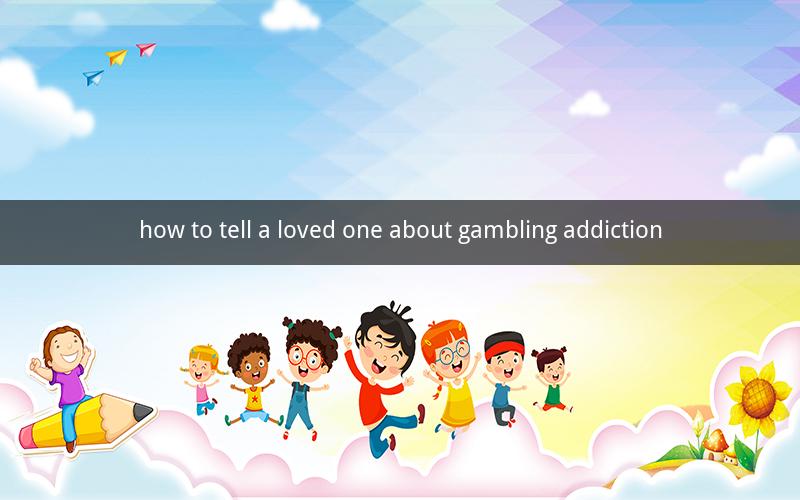
Table of Contents
1. Understanding the Importance of Telling
2. Preparing Yourself for the Conversation
3. Choosing the Right Time and Place
4. Expressing Concerns with Empathy
5. Using 'I' Statements
6. Providing Information on Gambling Addiction
7. Encouraging Professional Help
8. Supporting Your Loved One
9. Handling Resistance and Denial
10. Maintaining Open Communication
1. Understanding the Importance of Telling
Before delving into the specifics of how to tell a loved one about gambling addiction, it is crucial to understand why this conversation is vital. Telling your loved one about their gambling addiction can be challenging, but it is essential for their recovery. By addressing the issue, you can provide them with the necessary support and resources to overcome their addiction.
2. Preparing Yourself for the Conversation
Before initiating the conversation, it is essential to prepare yourself emotionally and mentally. Reflect on your own feelings and beliefs regarding gambling addiction. This preparation will enable you to approach the conversation with empathy and understanding.
3. Choosing the Right Time and Place
Selecting the right time and place for the conversation is crucial. Find a private and comfortable setting where you can speak openly without interruptions. Choose a moment when your loved one is relaxed and not under stress or pressure.
4. Expressing Concerns with Empathy
Start the conversation by expressing your concerns for your loved one's well-being. Use "I" statements to convey your feelings without placing blame. For example, say, "I am worried about your health and financial stability due to your gambling habits."
5. Using 'I' Statements
"I" statements are a powerful way to communicate your feelings without sounding accusatory. For instance, instead of saying, "You are a problem gambler," say, "I am concerned about the impact of your gambling on our family."
6. Providing Information on Gambling Addiction
Educate your loved one about gambling addiction, explaining that it is a chronic condition that requires professional help. Discuss the signs and symptoms of addiction, such as preoccupation with gambling, loss of control, and negative consequences.
7. Encouraging Professional Help
Recovery from gambling addiction is most effective when professional help is sought. Encourage your loved one to seek therapy, counseling, or join a support group. Offer to help them find appropriate resources and support.
8. Supporting Your Loved One
Express your willingness to support your loved one throughout their recovery journey. Offer to accompany them to appointments, provide transportation, or help with daily tasks. Let them know that you are there for them, no matter what.
9. Handling Resistance and Denial
Your loved one may resist or deny the existence of their gambling addiction. Be prepared to handle these situations with patience and understanding. Avoid confrontational language and focus on expressing your concerns and support.
10. Maintaining Open Communication
After the initial conversation, maintain open communication with your loved one. Encourage them to share their feelings and experiences during recovery. Be a listening ear and offer your support when needed.
Now, let's address some common questions regarding how to tell a loved one about gambling addiction:
1. What if my loved one becomes defensive during the conversation?
Answer: Stay calm and composed. Avoid becoming confrontational. Instead, focus on expressing your concerns and support.
2. How can I ensure that my loved one understands the seriousness of their addiction?
Answer: Provide them with information about gambling addiction, including the potential consequences and the importance of seeking professional help.
3. Should I confront my loved one about their gambling addiction in front of others?
Answer: No, it is best to have the conversation in a private setting to avoid embarrassment and ensure a more meaningful discussion.
4. How can I help my loved one find professional help?
Answer: Research local therapists, counselors, and support groups. Offer to help them schedule appointments and provide transportation if needed.
5. What if my loved one refuses to seek help?
Answer: Continue to express your concerns and support, but be prepared for resistance. Offer your help and remind them that you are there for them, regardless of their decision.
6. How can I support my loved one during their recovery journey?
Answer: Offer your emotional support, be a listening ear, and help them with daily tasks. Encourage them to participate in support groups and therapy sessions.
7. What if my loved one's addiction causes financial or legal problems?
Answer: Help them address these issues by offering support and guidance. Encourage them to seek professional help to manage these challenges.
8. How can I maintain my own emotional well-being during this process?
Answer: Seek support from friends, family, or support groups. Remember to take care of yourself and prioritize your mental and physical health.
9. What if my loved one's addiction affects our relationship?
Answer: Communicate openly and honestly with your loved one about your concerns. Work together to find ways to rebuild trust and strengthen your relationship.
10. How long should I wait before I bring up the topic of gambling addiction again?
Answer: There is no specific timeline for discussing gambling addiction again. However, it is essential to maintain open communication and check in on your loved one's progress regularly.